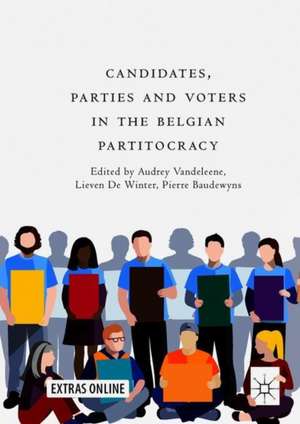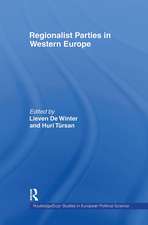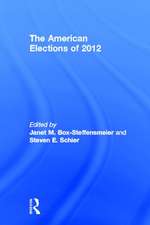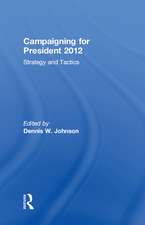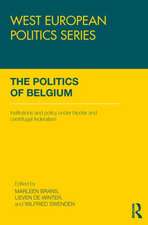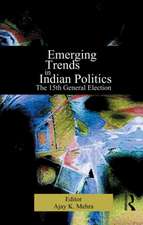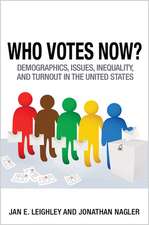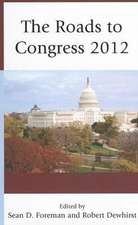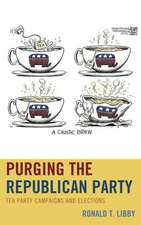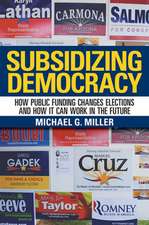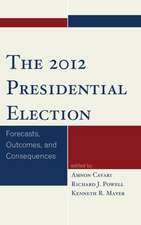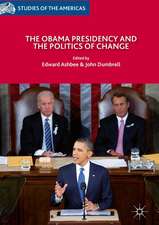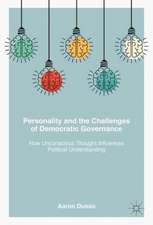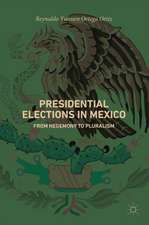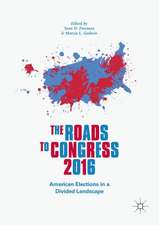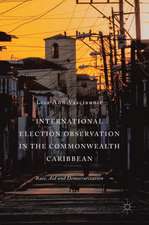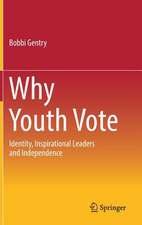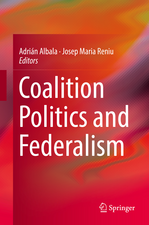Candidates, Parties and Voters in the Belgian Partitocracy
Editat de Audrey Vandeleene, Lieven De Winter, Pierre Baudewynsen Limba Engleză Hardback – 13 noi 2018
Preț: 694.32 lei
Preț vechi: 867.91 lei
-20% Nou
Puncte Express: 1041
Preț estimativ în valută:
132.86€ • 139.35$ • 110.60£
132.86€ • 139.35$ • 110.60£
Carte disponibilă
Livrare economică 11-25 martie
Livrare express 22-28 februarie pentru 43.54 lei
Preluare comenzi: 021 569.72.76
Specificații
ISBN-13: 9783319964591
ISBN-10: 3319964593
Pagini: 405
Ilustrații: XXVI, 398 p. 32 illus., 4 illus. in color.
Dimensiuni: 148 x 210 x 31 mm
Greutate: 0.84 kg
Ediția:1st ed. 2019
Editura: Springer International Publishing
Colecția Palgrave Macmillan
Locul publicării:Cham, Switzerland
ISBN-10: 3319964593
Pagini: 405
Ilustrații: XXVI, 398 p. 32 illus., 4 illus. in color.
Dimensiuni: 148 x 210 x 31 mm
Greutate: 0.84 kg
Ediția:1st ed. 2019
Editura: Springer International Publishing
Colecția Palgrave Macmillan
Locul publicării:Cham, Switzerland
Cuprins
1. Introduction. Candidates Between Parties and Voters: A Triadic Relationship in the Belgian Partitocracy.- 2. The Effects of the Political Parties’ Selective Filter Bias on Descriptive Representation: Analysis of the Candidates’ Sociological and Political Background.- 3. The More, the Smoother? Candidate Selection and Intraparty Competition.- 4. Who Wins More? Understanding Preferential Voting by Means of Context and Candidates’ Background and Campaigning.- 5. The Puzzle of Personalization of Politics: Evidence From Candidate Campaigns in Belgium 2007–2014.- 6. Campaigning and Candidates: Different Strategies for Different Candidates.- 7. The Electoral Impact of Local Campaigning in the 2014 Regional and Federal Elections.- 8. Constituting the List Amid Time of Personalization of Politics: The Balance of Congruent and Popular Candidates in Belgian Political Parties.- 9. Who Do You Feel and What Future Do You Want for Belgium? A Comparison of Candidates and Voters’ Identities and Institutional Preferences.- 10. From More or Less Integration to Status Quo? Explaining Candidates’ and Citizens’ Attitudes Towards European Integration.- 11. Between Parties and Voters: Candidates’ Role Conception in the Belgian Partitocracy.- 12. Critical Candidates: Elite Attitudes Towards the Functioning of Representative Democracy.- 13. Conclusion. Studying Candidates, Parties and Voters. Lessons Learned and New Questions.
Notă biografică
Audrey Vandeleene is Researcher in the Department of Political Science at Lund University, Sweden.
Lieven De Winter is Senior Professor of Political Science at the Centre of Political Science and Comparative Politics (CESPOL), Université Catholique de Louvain, Belgium.
Pierre Baudewyns is Professor of Political Science at the Centre of Political Science and Comparative Politics (CESPOL), Université Catholique de Louvain, Belgium.
Textul de pe ultima copertă
A black box in the study of representation in European democracies is our knowledge about elected but also unelected candidates. What is their background? How are they recruited? What are their campaign aims, strategies, resources and tools? How do they relate to their (constituency and central) party and their voters? How do they consider democratic governance at national and European levels? This book focuses on the triadic relationship between candidates and the other poles of the delegation and accountability triangle: political parties and voters. The chapters rely mostly on the Belgian Candidate Survey (CCS project) gathering about 2000 candidates belonging to 15 parties running for the 2014 federal and regional elections. Most conclusions do not hold only for the Belgian partitocracy but answer broad political science questions on elite recruitment, electoral strategies, personalisation, party cohesion, and descriptive and substantive representation. Its multilevel semi-open electoral system, atypical federal structure, and extreme party system fragmentation make Belgium a rich but complex case offering findings highly relevant to research on candidates in other democracies.
Audrey Vandeleene is Researcher in the Department of Political Science, Lund University, Sweden.
Lieven De Winter is Senior Professor of Political Science at the Centre of Political Science and Comparative Politics (CESPOL), Université Catholique de Louvain, Belgium.
Pierre Baudewyns is Professor of Political Science at the Centre of Political Science and Comparative Politics (CESPOL), Université Catholique de Louvain, Belgium.
Caracteristici
Analyses the variations of Belgian candidates’ political and socio-demographic background, campaign behaviour towards voters and parties, and policy views Digs into the triadic delegation and accountability relationship between candidates, voters, and parties Based on rich data from the Belgian Candidate Survey 2014
